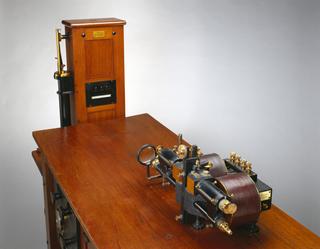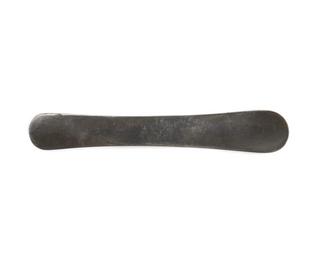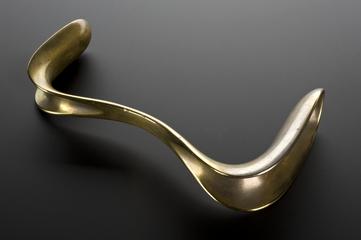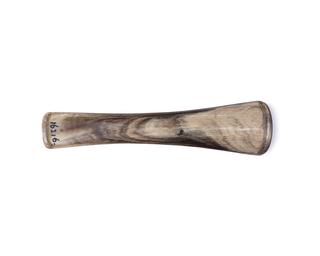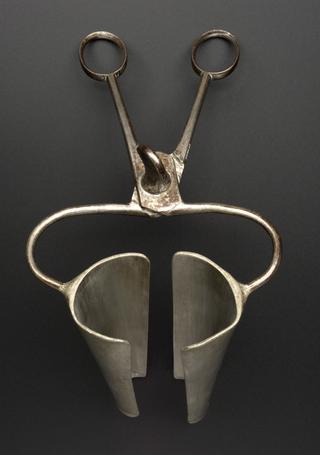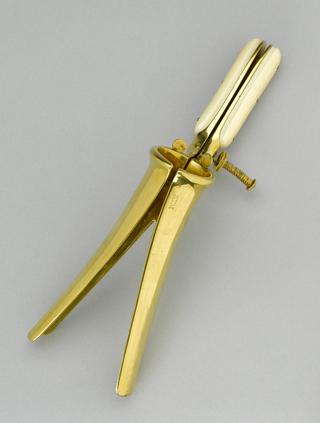










PA-100 AST System main unit, for the rapid and automated analysis of urine samples to accurately identify bacterial infection and antibiotic treatment, winner of the Longitude Prize on AMR (antimicrobial resistance), made by Sysmex Astrego, Sweden, 2024, ref Bl822880, MAC A4-AE-11-1C25-33, SN 40
Picked out of 250 entries, the Sysmex Astrego team won the £8-million Longitude Prize on Antimicrobial Resistance (AMR) in June 2024. The prize, launched in 2014 by Nesta and delivered by Challenge Works, asked teams to invent an easy-to-use test to diagnose infections and guide antibiotic prescribing. Misuse and overuse are causes of antimicrobial resistance. By 2050, it is predicted that if no action is taken antibiotic resistant infections will cause 10 million deaths a year.
The winning team chose to focus on Urinary Tract Infections (UTIs). UTIs affect 50% of women at least once in their lifetime. Current laboratory tests take 3 days to give a result. Dipstick tests that are used in clinics today are inaccurate 40% of the time. UTIs are painful, cause fevers and are disruptive to everyday life. Prescribing the right antibiotic at the right time is essential for patients, and to preserve effective antibiotics. UTIs are responsible for 15% of all antibiotics used in human medicine, and resistance is common.
Sysmex Astrego’s invention works by adding a small, fresh, urine sample to a cartridge, which is then inserted into the device. The sample is kept at the human body temperature and has a nutrient solution to stimulate any bacterial growth. Within 15 minutes, the device will tell the user if there is a bacterial infection present. Inside the cartridge is a microfluidic silicone chip with 11000 nano-channels where individual bacteria are trapped. Some of the bacteria are exposed to antibiotics, while others are not. Light is projected through the nano-channels and a microscope takes images, to observe the growth of any bacteria present and to see their reaction to different antibiotics. The images are then analysed by the software. Within 45 minutes, a result is given to determine which of five types of antibiotics can be used for treatment. Every day the device does a self-test to ensure it is functioning correctly.
With the winning prize-money the team are continuing to run studies in the UK and aim to roll out their device through Europe. There is potential to tailor the test for use with different kinds of UTIs and antibiotics.
Sysmex Astrego AB’s story began at Johan Elf’s research laboratory at Uppsala University, Sweden. Here they developed ways to make measurements of processes in single bacterial cells including their response to antibiotics. The combination of work in microscopy, image analysis and fluidics (generating and controlling fluid flows without mechanical moving components), led to the innovation that was patented in 2015. They were inspired by the Longitude Prize to continue their work.
Astrego was founded in 2017. The founders, co-founders and team who started the company were Johan Elf, Özden Baltekin, Ove Öhman, Petter Knagge, Mike Read, Mikael Olsson, Elias Amselem, Martin Lovmar and Johan Öhman. They created their company name from the acronym AST (Antibiotic Susceptibility Testing) and the word rego – Latin for to guide. In 2022, they were acquired by Sysmex and took on the name Sysmex Astrego.
Details
- Category:
- Clinical Diagnosis
- Object Number:
- 2024-481
- Measurements:
-
overall: 200 mm x 220 mm x 360 mm, 13 kg
- type:
- diagnostic test
